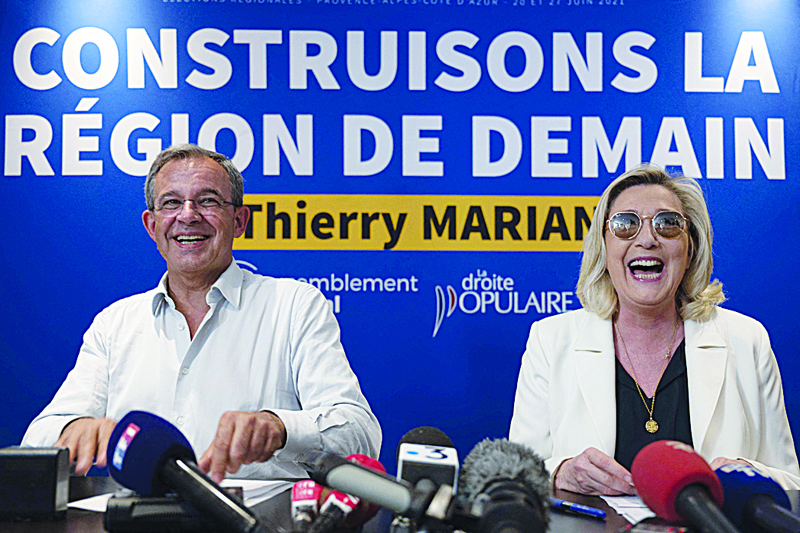 TOULON: French far-right Rassemblement National (RN) party's leader and member of parliament Marine Le Pen (R) shares a laugh with RN top candidate in Provence-Alpes-Cote d'Azur (PACA) for the upcoming regional elections Thierry Mariani (L) during a press conference in Toulon. - AFP
TOULON: French far-right Rassemblement National (RN) party's leader and member of parliament Marine Le Pen (R) shares a laugh with RN top candidate in Provence-Alpes-Cote d'Azur (PACA) for the upcoming regional elections Thierry Mariani (L) during a press conference in Toulon. - AFP
PARIS: French far-right leader Marine Le Pen has been touring the country ahead of regional elections this weekend, upbeat about her party's prospects as she tries to steer it further into the mainstream. Her National Rally (RN) party has focused on security, immigration and extremism in its campaign-issues at the centre of the country's current political debate that have forced candidates across the spectrum to lay out their agenda.
"We're at the political heart of the country," Le Pen boasted at a campaign stop in the town of Saint Chamond in southeastern France earlier this month. The regional vote, which was delayed because of Covid, is being closely watched as the last political test before next year's presidential election.
As a third wave of the coronavirus pandemic ebbs in France, surveys show that crime and terrorism are among the leading priorities for French people.Recent events have kept the issues in the headlines: from several fatal attacks on the police this year to the beheading of a teacher in the street in late 2020 by a radical Islamist, which supercharged a longstanding debate about integration and Islam.
The government of President Emmanuel Macron has pushed new legislation to combat violence and extremism, while the centre-right Republicans opposition has also sought to position itself as the true party of law and order. Ahead of the vote, which takes place over two consecutive weekends, Le Pen has made no apologies for focusing her campaigning on national policy issues such as crime and policing. She has her eyes firmly set on the presidential polls in April and May next year, which surveys currently show could come down to a duel between her and Macron, in a repeat of the 2017 election.
Uncertain outcome
The regional vote will see new assemblies elected for mainland France's 13 regions and 96 departments. Analysts caution against trying to extrapolate too much from the results that in many cases will be driven by local dynamics, limiting how much they should be seen as indicators for the larger political picture.
But the outcome will inevitably shape the narrative in the coming weeks, particularly with regard to the strength and electability of Le Pen, as well as the state of Macron's enfeebled party, the Republic on the Move (LREM). Predictions are difficult because of the complicated two-stage electoral system, an abstention rate that could reach 60 percent and the impact of tactical voting, which usually sees mainstream parties gang up to keep the far-right out of power.
A survey by the Ipsos and Sopra Steria groups on June 12 showed RN candidates leading in six of the 13 mainland regions in the first round, but they might end up losing all of the run-off votes, as they did last time in 2015. "What would be great for her (Le Pen), and would spark some momentum in the pre-presidential campaign, would be if the National Rally won a region," Stephane Zumsteeg from the Ipsos polling firm told AFP.
Though far-right politicians run some towns and villages, the RN has never led a region, which would give it a budget of billions of euros and powers over schools, transport and economic development. The one most likely to tip is the southeastern Provence-Alpes-Cote d'Azur, where the RN is fronted by Thierry Mariani, a former minister who defected from the centre-right Republicans party in 2019.
Macron's LREM is seen winning one region at best, but Zumsteeg says this might not affect the president whose personal poll ratings have risen recently. "Macron has succeeded in not linking his destiny to the image of his party," he said. Antoine Bristielle, a public opinion expert at the left-leaning Jean-Jaures Foundation, believes the vote will likely serve as another step in the normalisation of the once-fringe far right. "You can see that it's not so much that the ideas of the National Rally are more popular or are more accepted by French society," he told AFP. "It's that the party no longer scares people enough to spark a wave of opposition." - AFP




